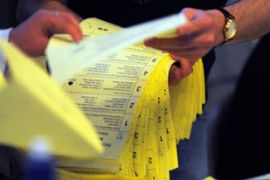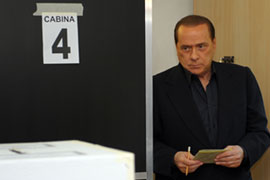EU voters punish leftist parties
Conservatives and far-right make gains amid record low turnout in 27-nation election.

The citizens of 19 nations went to the polls on Sunday, after the other eight EU nations had voted in the huge transnational election earlier in the week.
But the election was marked by voter apathy, with just 43.01 per cent of the 375 million eligible voters casting their ballots compared with 45.47 per cent at the last election in 2004, according to a survey by TNS-Opinion pollsters.
Conservative success
| In depth | ||
|
|
In Germany, the conservatives of Angela Merkel, the chancellor, seemed likely to emerge as the largest party group, raising hopes that they will be able to dispense with the left-right “grand coalition” after a general election in four months.
Her Social Democrat rivals were heading for their worst showing in an election since the second world war, projections suggested.
“We are the force that is acting level-headedly and correctly in this financial and economic crisis,” Volker Kauder, the leader of Merkel’s party in the German parliament, said.
Conservative governments in France and Italy also appeared likely to defeat their left-wing rivals.
The UMP party of Nicolas Sarkozy, the French president, led the opposition Socialist with with 28 per cent of the vote to 17 per cent, according to polling agencies.
The Freedom People’s Party of Silvio Berlusconi, the Italian prime minister, looked set to win at least 39 per cent of the vote despite a deep recession and a scandal over his private life.
‘Difficult evening’
But centre-left ruling parties did not appear to be fairing to well.
With 88.49 per cent of votes counted in Spain, the opposition Popular party had won 23 of the 50 seats up for grabs, compared to 321 seats for the Socialist Party of Jose Luis Rodriguez Zapatero, the prime minister.
 |
| Berlusconi’s party looked set to win in Italy despite a personal scandal [AFP] |
In Britain, poor results for the ruling Labour party seemed likely to renew calls for Gordon Brown, the prime minister, to step aside in favour of a new party leader.
Official results showed Nick Griffin, the leader of the far-right British National Party, had won a seat in the parliament, the second candidate from the anti-immigration party to be elected.
Martin Schulz, the leader of the Socialist grouping in the European parliament, conceded that “tonight is a very difficult evening for Socialists in many nations in Europe”.
Daniel Gros, chairman of the European Movement, told Al Jazeera: “People are frustrated. They don’t have a clear choice between left and right. They just see economic difficulties mounting, but don’t have a way to solve them.
“The far-right in some cases made spectacular gains, mainly in smaller marginal countries like Holland.”
Right-wing gains
In the Netherlands, the party of Geert Wilders, who has criticised Islam and the Quran, was projected as likely to win more than 15 per cent of the country’s votes, damaging a ruling alliance of conservatives and socialists.
With most of the votes counted in Austria, the main right-wing party gained strongly while the Social Democrats, the main party in the governing coalition, lost substantial ground.
But the big winner in Austria was the Freedom party, which campaigned on an anti-Islam platform, doubling its strength over the 2004 elections to 13 per cent of the vote.
Hungary’s far-right Jobbik party won three seats of the country’s 22 spots in the European parliament elections, only one less than the ruling Socialist party.
Jobbik describes itself as Eurosceptic and anti-immigration and has called for police to crack down on petty crimes committed by gypsies.
